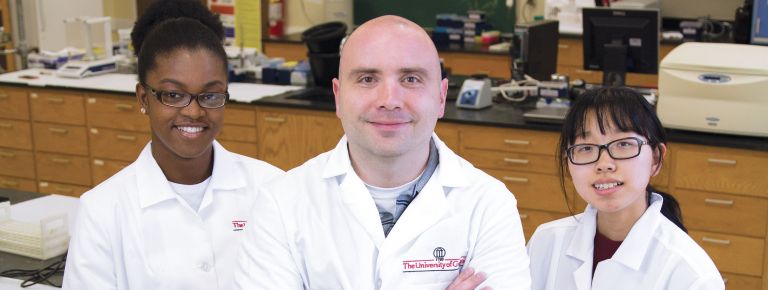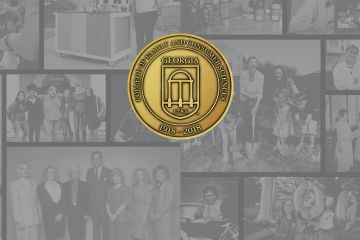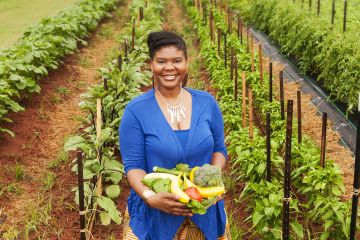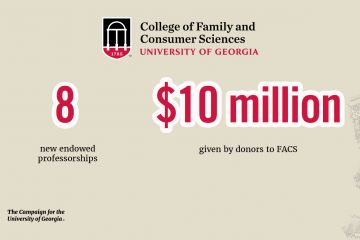A View Behind the Curtain
She called him her little brother.
Whitney Okie grew up in a house in Cameroon in west central Africa with aunts, uncles and cousins all happily sharing the same space.
Little Ghislever, or “Gizzo,” as they called him, was Whitney’s 2-year-old cousin, but the family was close and families stick together, so cousins were more like siblings.
While Okie was away at boarding school, Gizzo fell ill. He never recovered.
“They never could figure out what was wrong with him,” Okie said. “They just had to come home and watch him slowly die.”
The death of her cousin marked a turning point in Okie’s life.
Where previously Okie’s ambitions ranged from becoming an astronaut to a journalist, Gizzo’s death pushed Okie into a new field, one that would hopefully provide answers and, maybe someday, allow her to prevent another similar loss.
“I was always trying to figure out what happened to my little cousin,” she said. “I thought maybe the medical field would explain that to me. When I came to college, I knew that’s exactly what I wanted to do.”
In 2009, Okie moved to the United States at age 14, settling with her family in Paulding County outside Atlanta.
By then, her desire to pursue a career in medicine had taken firm shape, and by the time she made her way to the College of Family and Consumer Sciences to study nutritional sciences, she knew specifically what she needed to do: get in a lab and perform research.
It was research, she said, that would help solve – or even prevent – deaths like the one she experienced.
“To figure out what was wrong, you have to go behind the scenes and do research,” Okie said. “Thinking about the next child I might be able to save because I had done research, that’s what pushed me. That was my defining moment.”
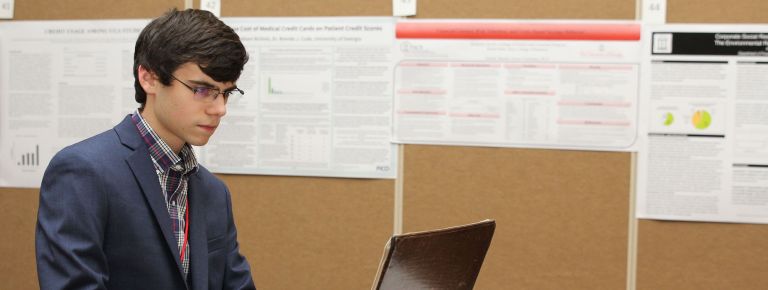
FHCE graduate Ben Jacobs researched financial literacy, savings behavior and risk tolerance of college students.
“A lot of work”
Research opportunities abound in FACS, where students from across campus pursue intensive studies in areas such as student credit card debt and financial literacy, childhood obesity and the foster care system.
Last year, dozens of UGA undergraduates pursued research with a FACS faculty member.
Eleven FACS faculty members served as mentors as part of the UGA Center for Undergraduate Research Opportunities (CURO), which will provide $1,000 stipends to 500 UGA students next year.
Brenda Cude, a professor in the FACS department of financial planning, housing and consumer economics, has mentored 15 undergraduate researchers in the last six years, including several students from UGA’s Terry College of Business who have sought her guidance.
She said most undergraduates who pursue research opportunities are eager for a deeper knowledge and a view “behind the curtain.”
“A lot of the students are looking for something more challenging than traditional coursework,” she said. “From the perspective of a faculty member, it’s incredible to have the opportunity to meet with bright young students who typically don’t know anything about research. The opportunity for learning is so great, and their perspective on the topic is typically somewhat different from mine, so it enriches my view as well.”
Okie found a home in Rob Pazdro’s Free Radical and Nutritional Genetics Laboratory in the FACS department of foods and nutrition, analyzing tissue samples to determine target gene expression.
The process proved revealing, both in her understanding of science and her own abilities, as she averaged about 15 hours a week outside of classes conducting research.
“I quickly realized how tiring it can get, doing the same thing over and over,” she said, laughing. “Research is very tedious, and I learned that there’s more to it than just fancy talk. There’s a lot of work behind it.”
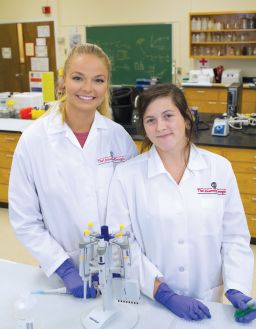
A lot of students are looking for something more challenging than traditional coursework. From the perspective of a faculty member the opportunity for learning is so great, and their perspective one the topic is typically somewhat different from mine, so it enriches my view as well.
A process of discovery
For as long as she can remember, Avery Campbell has had an interest in relationships: how they go wrong, how they can be made stronger.
Though she graduated in May with a psychology degree, she also completed a minor in the FACS department of human development and family science.
Last summer, prior to the start of her senior year, she found HDFS faculty member Ted Futris after an extensive online search for UGA faculty members studying relationships.
Futris, director of the FACS Couples and Relationship Enrichment (CARE) Lab, met with Campbell at length before offering her a spot in the lab helping with research.
Campbell started out performing data entry, typing in responses to surveys of teens about their relationships. Eventually, she was able to assist a graduate student, Evin Richardson, with a research project involving foster families.
Campbell presented her work at the CURO Symposium in April, and her work as an undergraduate researcher has “turned” her, she said.
Campbell, who also interns at the FACS ASPIRE Clinic where she shadows grad students involved in hands-on couples counseling, now wants to pursue a career as a marriage and family therapist.
She will enroll in graduate school in the coming months.
“At UGA, the education you get here about research really does set you apart and makes you feel confident going into graduate school,” Campbell said. “I can’t put a price on the experience I got and how much it’s going to help me later on.”
Ben Jacobs had a similar experience. Jacobs, who graduated in May in the accelerated master’s program in financial planning, participated in CURO under the direction of FACS faculty member Swarn Chatterjee.
His project dealt with financial literacy, risk tolerance and savings behavior of college students, trying to determine if a person’s knowledge of finances had an effect on his or her risk tolerance.
The project was based largely on Jacobs’ own observations of friends’ saving habits. Jacobs, like Campbell, presented his research at the CURO Symposium in April, and now works for a local financial planning firm as an analyst.
“It provided me with a better idea of what it’s like to actually write and conduct research,” Jacobs said of his CURO experience. “I learned a lot about doing research in classes, but it’s totally different to actually research something.”
Critical thinking
The mice had come down with some sort of mysterious infection.
These were not ordinary mice. Pazdro had paid a handsome sum for the creatures to be used in his genetics study, and the fact that they had suddenly turned up sick created quite a bit of panic. Would it derail the entire project?
Days after the mini-crisis had been averted, Pazdro could smile. That’s one of the benefits of research, he said.
“You have to learn how to think on your feet and troubleshoot,” he said, recalling his own days as an undergraduate researcher and the lessons he took from it. “Through research, I’ve learned how to deal with problems as they come up and how to think logically through them to minimize the damage associated with a problem.”
Annie Jiang, an undergraduate statistics major who works in Pazdro’s lab, has seen this firsthand.
“I’ve learned that analyzing data in real life is more complicated than working with data in classwork and homework,” she said. “The experience was very essential to my academic career.”
For Pazdro, Jiang’s point illustrates one of the primary benefits of research in general, and undergraduate research in particular: it teaches students to think critically.
Watching inexperienced researchers mature and make wise decisions, he said, is the highlight of his job as a mentor.
Seeing students like Jiang and Okie, and many others, listed as contributing authors on research papers is another bonus.
“A lot of pre-med students come through here, and I tell them you may encounter different cases where you’ll have patients that may have atypical symptoms who won’t be easy to diagnose,” he said. “Having a few years of research experience gives you that mindset of understanding (that) we’re working in the dark, we don’t know what we’re going to see, but we have to be very flexible in our ability to think through these problems.”
Okie, one of Pazdro’s prized undergraduate researchers, graduated in May with a degree in nutritional sciences, and has spent the summer studying for the Medical College Admission Test.
She hopes to be accepted into medical school in October, and credits her time in Pazdro’s lab as being a major part of her academic journey.
“When I started, I just wanted to learn,” she said, “because it’s always good to pursue knowledge. That experience ended up defining the rest of my college career.”
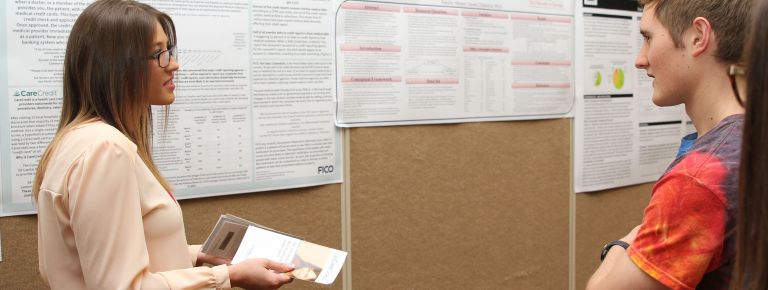
Madison Nichols
Madison Nichols, a consumer economics major, conducted research under the mentorship of FACS professor Brenda Cude as part of UGA’s CURO program.
Nichols’ project, titled “The True Cost of Medical Credit Cards on Patient Credit Scores,” was “a little personal,” she said, due to her family’s experience with the healthcare system.
“The research I collected proved undoubtedly that medical debt is a major problem in the modern American economy,” Nichols said. “Unfortunately, many American medical patients are either not educated on the effect of unpaid credit on financial history or have no option when seeking a way to pay the growing costs of healthcare for necessary treatment.”
Nichols said she would recommend the CURO program to any undergraduate seeking a deeper understanding of a topic.
“CURO undoubtedly gave me a better understanding of multiple topics and gave me a chance to be mentored by an incredible professor,” Nichols said. “I would strongly recommend applying for CURO because of the specific knowledge that a student can gain outside of a classroom setting and that the research conducted can give a stronger sense of understanding in an individual or broad topic.”
